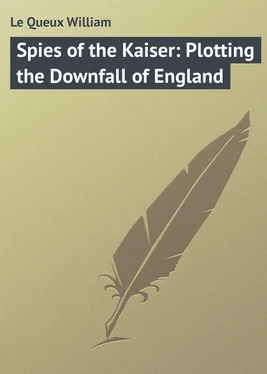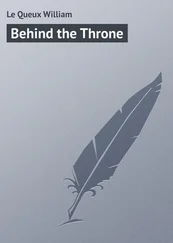William Le Queux - Spies of the Kaiser - Plotting the Downfall of England
Здесь есть возможность читать онлайн «William Le Queux - Spies of the Kaiser - Plotting the Downfall of England» — ознакомительный отрывок электронной книги совершенно бесплатно, а после прочтения отрывка купить полную версию. В некоторых случаях можно слушать аудио, скачать через торрент в формате fb2 и присутствует краткое содержание. Жанр: foreign_prose, на английском языке. Описание произведения, (предисловие) а так же отзывы посетителей доступны на портале библиотеки ЛибКат.
- Название:Spies of the Kaiser: Plotting the Downfall of England
- Автор:
- Жанр:
- Год:неизвестен
- ISBN:нет данных
- Рейтинг книги:3 / 5. Голосов: 1
-
Избранное:Добавить в избранное
- Отзывы:
-
Ваша оценка:
- 60
- 1
- 2
- 3
- 4
- 5
Spies of the Kaiser: Plotting the Downfall of England: краткое содержание, описание и аннотация
Предлагаем к чтению аннотацию, описание, краткое содержание или предисловие (зависит от того, что написал сам автор книги «Spies of the Kaiser: Plotting the Downfall of England»). Если вы не нашли необходимую информацию о книге — напишите в комментариях, мы постараемся отыскать её.
Spies of the Kaiser: Plotting the Downfall of England — читать онлайн ознакомительный отрывок
Ниже представлен текст книги, разбитый по страницам. Система сохранения места последней прочитанной страницы, позволяет с удобством читать онлайн бесплатно книгу «Spies of the Kaiser: Plotting the Downfall of England», без необходимости каждый раз заново искать на чём Вы остановились. Поставьте закладку, и сможете в любой момент перейти на страницу, на которой закончили чтение.
Интервал:
Закладка:
Therefore I lit my pipe, and idled up and down, keeping the letter-box in view. In the window, directly above it, was a clock which showed it then to be a quarter to eight. I took a pretended interest in the small shops near, until about four minutes to the hour a closed motor-car swung round from the direction of the Public Hail, and pulled up before the post office.
From it two men alighted – one a youngish fair-haired man, and the other, dark-bearded and much older, wore a thick grey overcoat and a white muffler. He was the man of whom I was in search.
I entered the office directly after the pair, on pretence of buying stamps, but already the elder of the two had handed in a letter to be registered, the address of which I failed to discern.
Both seemed to be in a great hurry, for as soon as the receipt was written out they re-entered the car and drove back in the direction they had come, leaving me standing helpless on the opposite side of the road.
Immediately I returned to the hotel where Ray was waiting, and reported to him, whereupon he seized his hat, and walking with me back to the post office halted in the centre of the road examining the wheel-tracks, which were still quite plain upon the damp roadway.
Then, as he walked back, he said:
"Do you know, Jack, that this town Beccles has been decided upon by the Germans as the head-quarters of the Army Corps which lands at Weybourne? It's a natural position, standing upon high ground and commanding the whole of the surrounding country. Signals made from that church tower yonder could be seen very far afield."
Then, as we sat together in the coffee-room of the hotel, eating a hasty meal, he remarked:
"We'll go back to Cromer to-night, but I shall go to town to-morrow. You'll wait till my return, won't you?"
So I was left alone for nearly a week; and on his return he announced that we must at once shift our quarters to Lowestoft. So south we went that same night, arriving at midnight, and putting up at the many-balconied Empire Hotel.
The town interested my companion not at all, but from there we went forth each day on long motor excursions, scouring the whole country as far south as Aldborough and as far west as Bury St. Edmunds. All the roads round Southwold, Bungay, Saxmundham, Stow Market, and many other towns we reconnoitred, apparently always with the same object – to discover wheel-tracks of a mysterious car.
The garages of every town Ray visited alone, but his inquiries always met with the same negative result.
Late one afternoon, however, when on the road between Wymondham and Diss, he suddenly shouted to the driver to stop, and jumping out, examined the track of wheels. The road, however, was hard at that spot, and it was some time before he could decide whether the car had travelled north or south.
"They've gone north!" he declared with satisfaction; therefore we continued to follow them towards Wymondham, where they had drawn up at the "Old Green Dragon," and gone forth again, striking into a by-road which led to Bracon Ash.
"Ha!" he cried, when he saw this, "so they're busy at work – that's plain!"
But by this time the light had faded, and much to our chagrin we were again compelled to give up the hunt, and find our way over by Hempnall, and so through Bungay back to Lowestoft.
Next day we were early back again at the spot, but heavy rain had unfortunately fallen all night, so the tracks had been obliterated.
After another week of unsuccessful journeying we were, one day, about half-way between Norwich going towards Aylsham, when my friend's keen eyes caught sight of a wheel-track coming out of a narrow by-road.
We halted, and descending he examined them minutely, declaring that they were what we were in search of, and quite fresh.
Therefore, considerably excited, we were soon upon the trail, following the car through Aylsham and North Walsham until, on the road that led towards the sea at Happisburgh, it suddenly turned into another byway.
Here Ray decided to pull up and follow on foot, which we did for nearly two miles, until we saw before us the railway line which runs between North Walsham and Yarmouth. We had left the road, for there, pulled up before us, was the car I had seen at Beccles, and on ahead were the two men, one of whom I recognised by his grey coat and white muffler.
They were beneath the railway bridge, carefully examining it.
"They're marking that down on their plan for destruction," remarked Ray between his teeth. "All these connections will be destroyed when they land. But, by heaven! we'll be even with them yet!"
We watched them in secret for a full half-hour, as they examined the railroad at several points, and when they had driven off we followed them along a road where ran six lines of telegraph into Happisburgh.
"Those wires," remarked Ray, "form one of the direct cables to Germany. They pass through Beccles, so you may rest assured that they've surveyed it well!"
At Happisburgh the tracks turned to the left, and thence again to the right to Walcot, but just as we were passing over a low hill we saw that the car on before us had stopped. The two men were photographing the country from Paston, inland towards Witton.
We drew up and watched their movements.
Then they went on, and we followed, parting company with their tracks at the cross-roads, they going westward, while we struck north, until we found ourselves once again in Cromer for the night.
That evening we made an amazing discovery at the hotel. Erna Stolberg was staying there alone under the name of Madame Hirsch! Ray first saw her seated in the reading-room, and called me. I peered in at the door and recognised her in a pale blue silk blouse and black net skirt, lying back in a chair reading an illustrated paper. She was evidently quite unsuspicious of our presence.
Ray was sorely puzzled. Next morning he sent a wire to Mrs. Hill-Mason's house in Charles Street, and before noon had received a reply from her at Bournemouth saying that Fräulein Stolberg had left her service a fortnight before.
"German spies are pretty active in East Anglia, old chap, as you've seen with your own eyes," he remarked to me.
In order that the woman should not notice us, we told the chauffeur to meet us out on the Norwich road, after which we travelled to quaint old Aylsham, where we idled away the day, spending the afternoon playing billiards at the "White Horse."
More than once during the day my companion examined the road outside for traces of wheel-tracks, but there were none like those of the car of those secret agents of Hermann Hartmann.
I noticed that Ray had brought with him a small brown brief-bag, an unusual thing for him to carry. But that morning he had placed it in the car with instructions to the chauffeur to move it on no account.
At four o'clock that afternoon he received a telegram, which he read through twice, and placed on the fire, remarking:
Конец ознакомительного фрагмента.
Текст предоставлен ООО «ЛитРес».
Прочитайте эту книгу целиком, купив полную легальную версию на ЛитРес.
Безопасно оплатить книгу можно банковской картой Visa, MasterCard, Maestro, со счета мобильного телефона, с платежного терминала, в салоне МТС или Связной, через PayPal, WebMoney, Яндекс.Деньги, QIWI Кошелек, бонусными картами или другим удобным Вам способом.
Интервал:
Закладка:
Похожие книги на «Spies of the Kaiser: Plotting the Downfall of England»
Представляем Вашему вниманию похожие книги на «Spies of the Kaiser: Plotting the Downfall of England» списком для выбора. Мы отобрали схожую по названию и смыслу литературу в надежде предоставить читателям больше вариантов отыскать новые, интересные, ещё непрочитанные произведения.
Обсуждение, отзывы о книге «Spies of the Kaiser: Plotting the Downfall of England» и просто собственные мнения читателей. Оставьте ваши комментарии, напишите, что Вы думаете о произведении, его смысле или главных героях. Укажите что конкретно понравилось, а что нет, и почему Вы так считаете.












